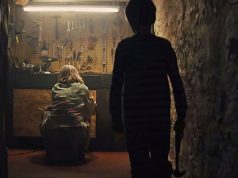In “The Talented Mr. Ripley,” the eponymous Tom Ripley (Matt Damon) delineates his talents as follows: “forging signatures, telling lies, impersonating almost anyone.”
He tells this to Dickie Greenleaf (Jude Law), and then proceeds to prove it by doing an impression of Dickie’s father — who, by the way, has sent Tom to Italy to get the rich punk Dickie to come home and quit spending daddy’s money.
Possessing those particular skills is necessary for Tom, as we soon learn that he has no identity of his own. That is to say, what small things we know about him — he works as a custodian at Princeton University, he plays classical piano, and Dickie’s father sent him to Italy because he thought Tom was an old friend of Dick’s — don’t add up to much.
What adds up to plenty is the character of Tom Ripley, who, for having such a sketchy past, turns out to be one of the most complex, powerful characters of the year, in a movie that is as richly disturbing as it is intriguing.
Dickie is lounging around Italy with his girlfriend, Marge (Gwyneth Paltrow), who claims to be a novelist or something. Tom befriends the two, but especially Dickie, convincing him they were at Princeton together and that they have many common interests. (Dickie likes jazz, for example, and so Tom, having done his homework, comes off as an aficianado as well.)
Soon the two are best of friends, spending all their time together in clubs and bars and beaches. Dickie sees it as any other male friendship, and in typical male fashion, is quick to ignore Tom when another friend interests him more at the moment.
For Tom, though, it’s altogether different. Though Tom’s homosexuality is never stated outright (in fact, he says “no” once when asked directly about it), it’s there and it’s obvious. His friendship with Dickie is a chance to have the brother he never had. He longs to have secrets that will just be theirs, anything to bond them together, anything that will enable Tom to feel like he has something with Dickie that no one else has.
The line between gay and straight is a fine one. This being Italy (in the 1950s, by the way), men often kiss each other on the cheeks as greetings. Dickie does this a lot, and he’s always putting his arm around his male friends. Physical affection is normal, and it means nothing. Law plays the part well, walking perfectly the line between no-emotions machismo and honest sensitivity. It sounds dumb, but Jude Law is great at playing a man — not just because he IS a man, but because he obviously UNDERSTANDS men. Plenty of men not in touch with their true selves would be incapable of playing this role with as much realism as Law does, in effect holding a mirror up to men in general and saying, “See how you are?”
Halfway through the film, things turn psychotic as Tom’s obsession with Dickie runs its course and he tries to assume Dickie’s identity. He doesn’t just want to be WITH Dickie; he wants to BE Dickie.
This is Damon’s movie all the way, and he performs brilliantly. His Tom Ripley is vulnerable and desperate without seeming so, a truly underplayed role that takes the audience through every nuance in his twisted little brain. His mannerisms make him just gay enough to pass for one without making mainstream audiences squirm.
Indeed, though homosexuality is a theme in this movie, it is discreet. No homosexual activity is shown or implied, and if you see Tom Ripley as a gay guy who gets a crush on a straight man, you’ve missed the point. Tom doesn’t want sex; he wants love and acceptance, even in a “straight” way. He wants a friend. He insists on calling Dickie his “brother”; the fact that Dickie sees Tom as nothing more than a pal to hang out with (and sometimes not even that) is crushing.
Tom sees in Dickie the things that he would like to be, even though he already is a lot of them (handsome, personable, charming) himself. It’s low self-esteem at its most devastating, and Damon’s portrayal of this sad, isolated, lonely man is heartbreaking.
Beautifully shot and directed by Anthony Minghella, the film lags slightly in the middle, between the initial character studies in the beginning and the psychodramatic twists in the end. But overall, it’s an eerily affecting film that reminds us that everyone has wanted to be someone else at some point in their lives.
A (; )





